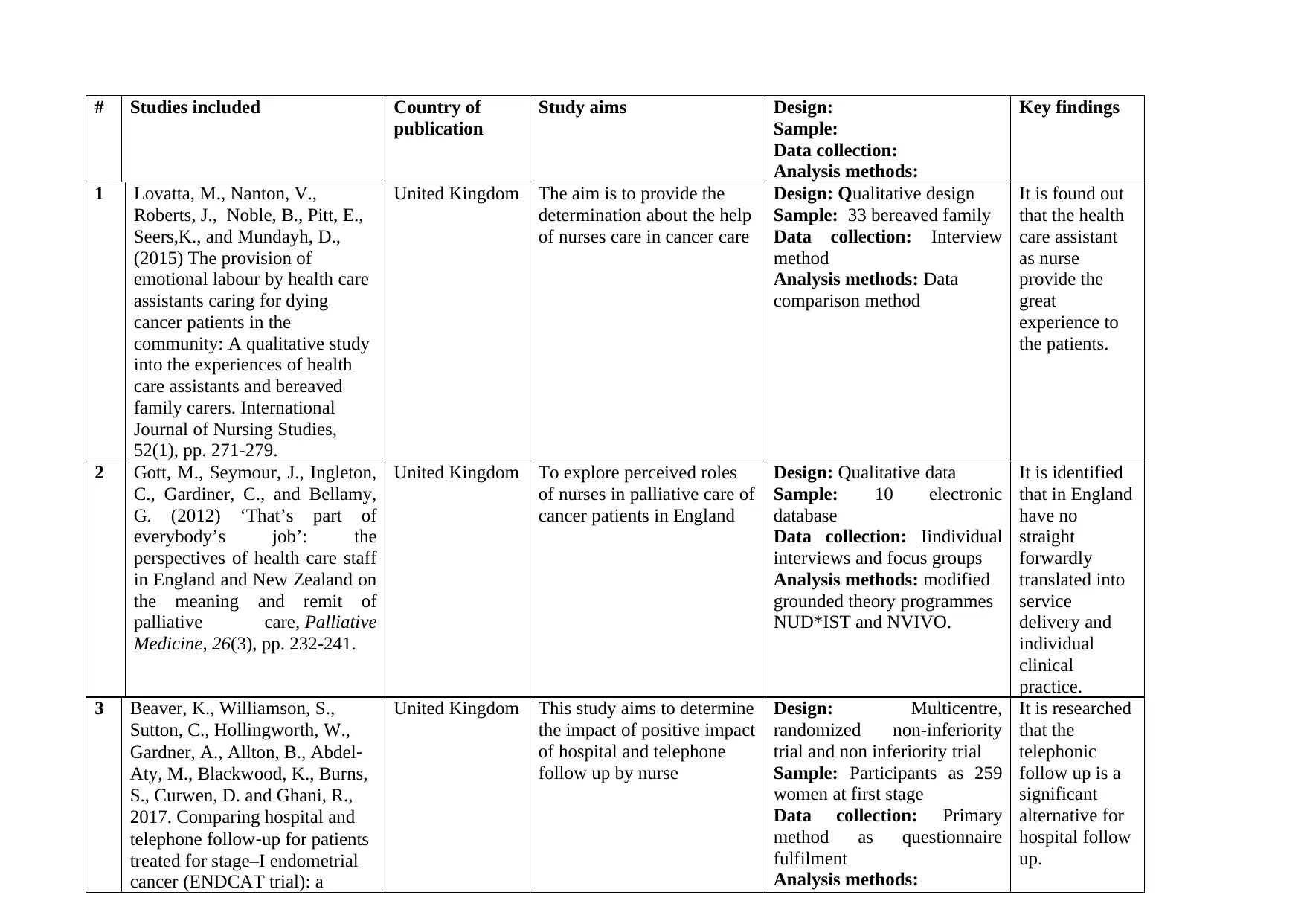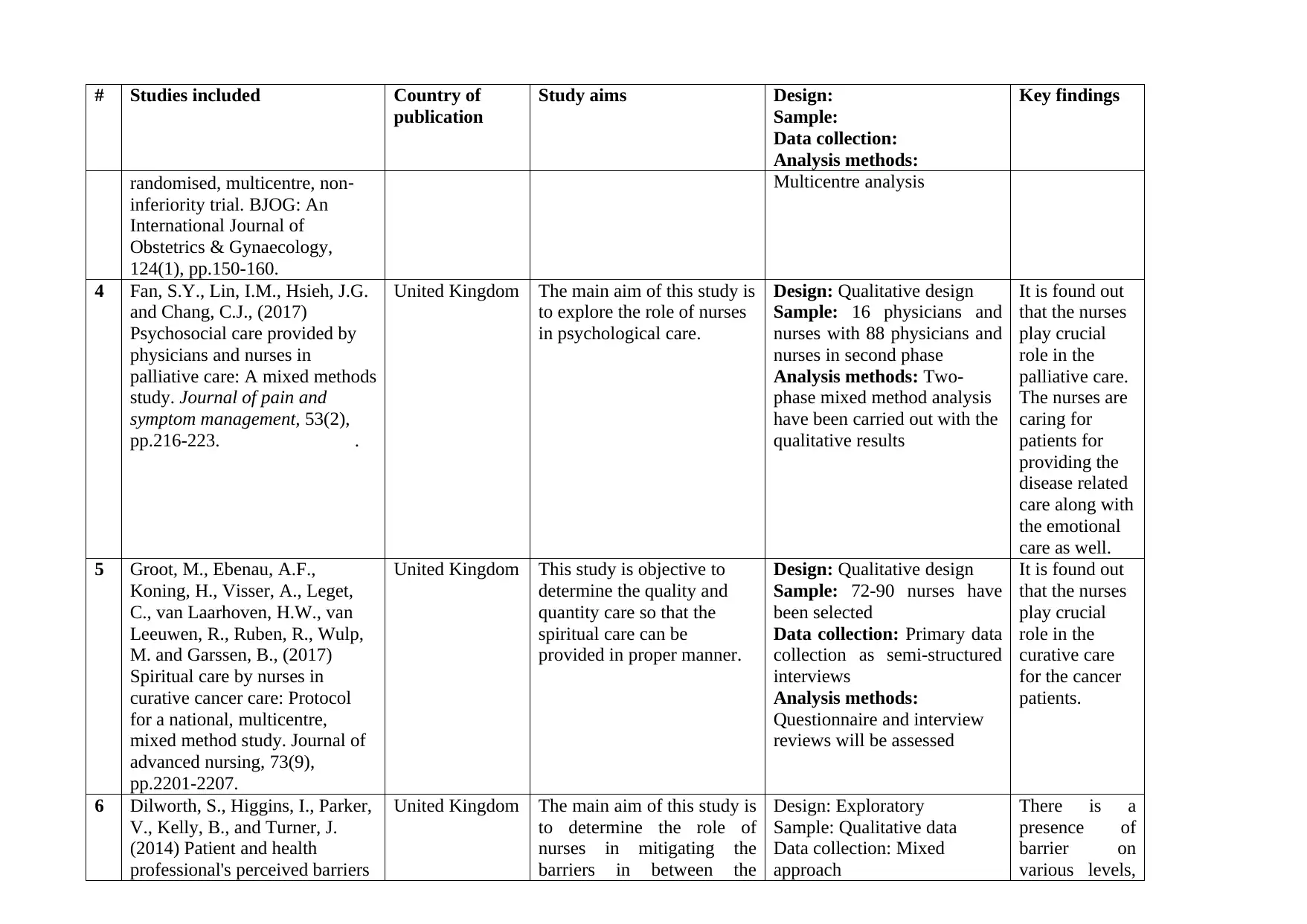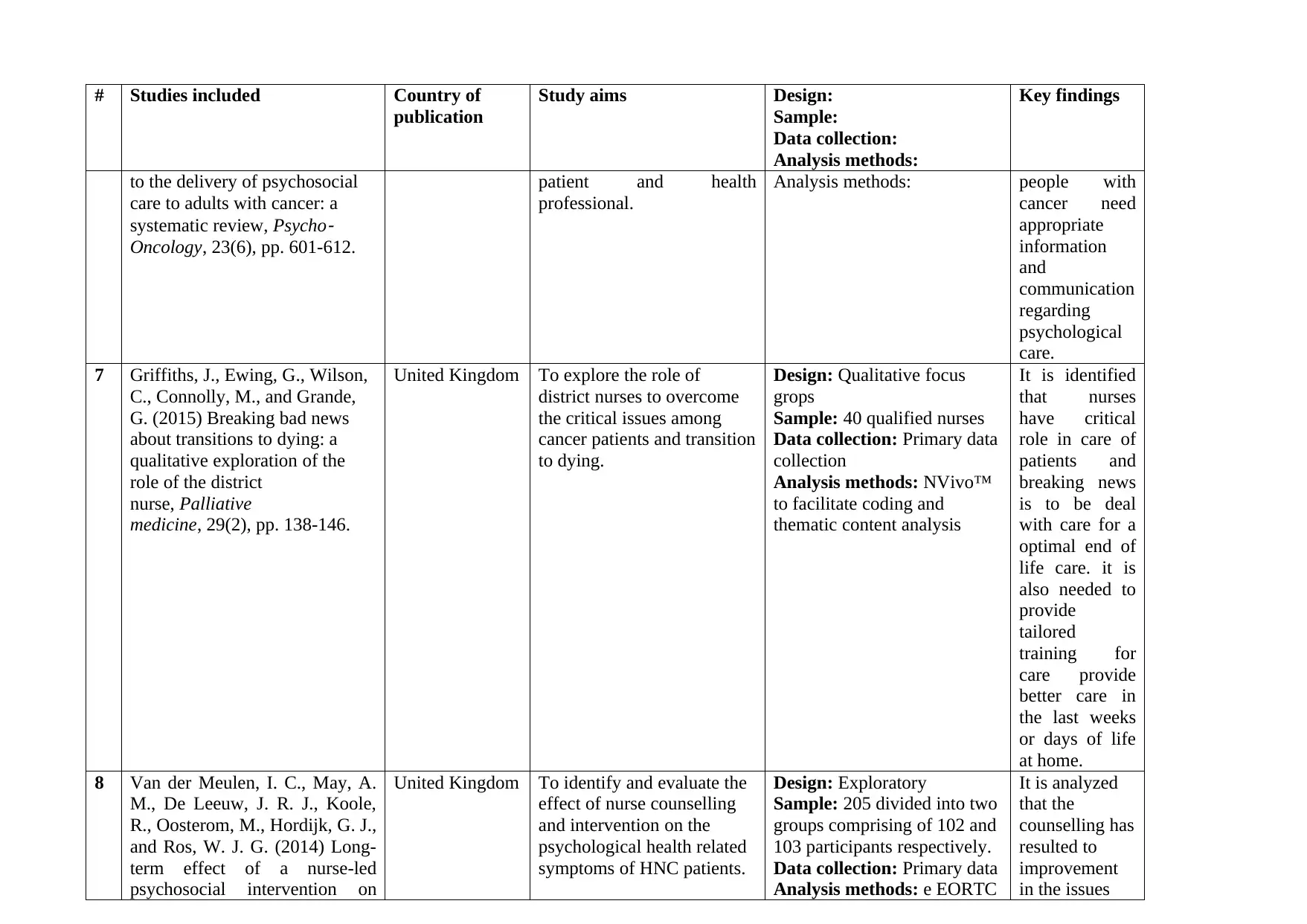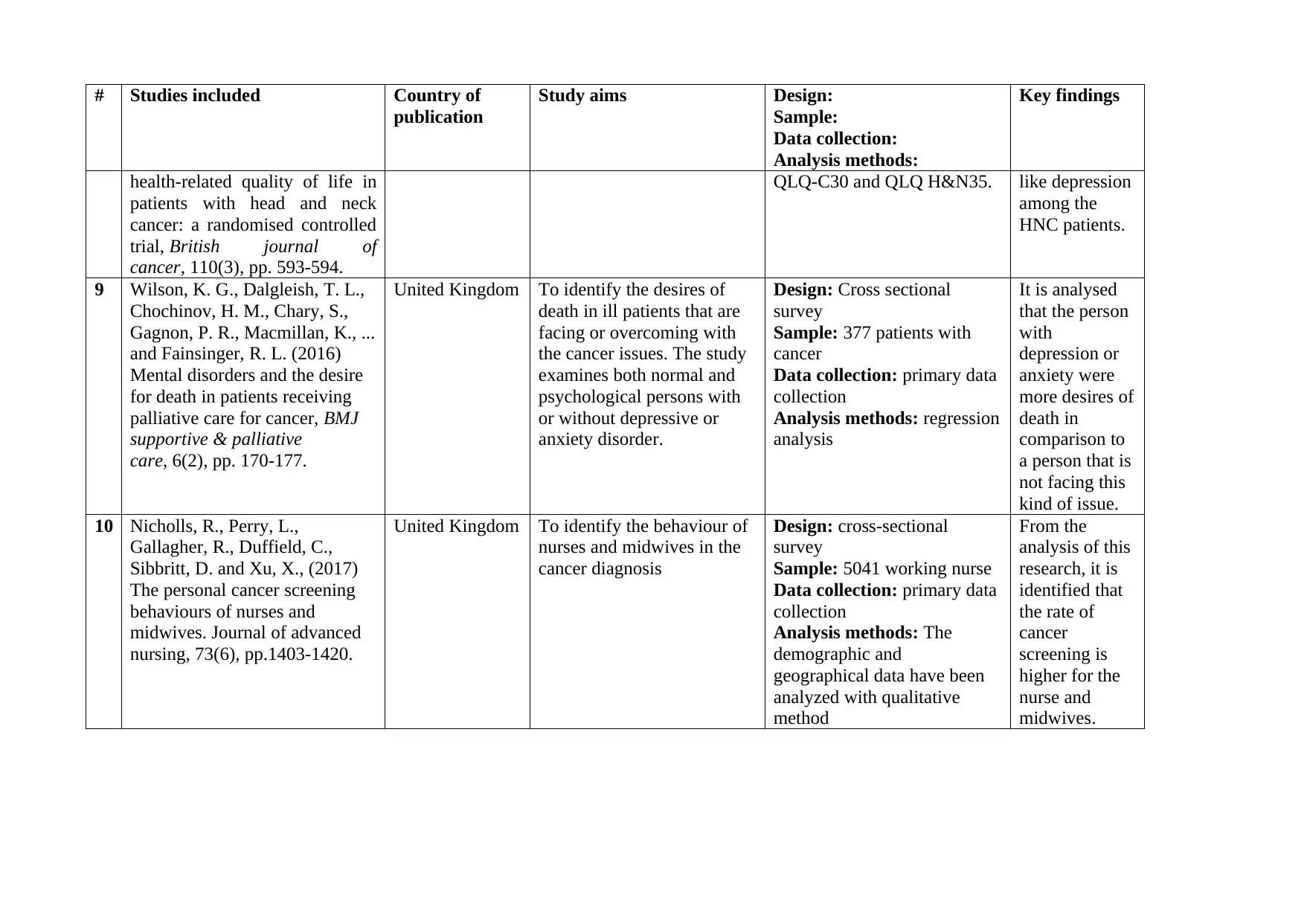Literature Review: The Impact of Nurses on Cancer Patient Care
VerifiedAdded on 2023/06/03
|4
|1516
|417
Literature Review
AI Summary
This literature review critically analyzes the multifaceted role of nurses in cancer care, drawing from a range of primary sources. The review explores the emotional labor provided by healthcare assistants, the perspectives of healthcare staff on palliative care, and the impact of hospital and telephone follow-ups by nurses. It further investigates the psychosocial and spiritual care provided by nurses, barriers to psychosocial care, and the role of district nurses in end-of-life transitions. The review also examines the effect of nurse-led psychosocial interventions on patients with head and neck cancer, the desire for death in palliative care patients, and the cancer screening behaviors of nurses and midwives. The synthesis of these studies highlights the critical contributions of nurses in providing holistic care, managing patient well-being, and navigating the complexities of cancer treatment and palliative support. Desklib offers this and many other solved assignments and past papers for students.

# Studies included Country of
publication
Study aims Design:
Sample:
Data collection:
Analysis methods:
Key findings
1 Lovatta, M., Nanton, V.,
Roberts, J., Noble, B., Pitt, E.,
Seers,K., and Mundayh, D.,
(2015) The provision of
emotional labour by health care
assistants caring for dying
cancer patients in the
community: A qualitative study
into the experiences of health
care assistants and bereaved
family carers. International
Journal of Nursing Studies,
52(1), pp. 271-279.
United Kingdom The aim is to provide the
determination about the help
of nurses care in cancer care
Design: Qualitative design
Sample: 33 bereaved family
Data collection: Interview
method
Analysis methods: Data
comparison method
It is found out
that the health
care assistant
as nurse
provide the
great
experience to
the patients.
2 Gott, M., Seymour, J., Ingleton,
C., Gardiner, C., and Bellamy,
G. (2012) ‘That’s part of
everybody’s job’: the
perspectives of health care staff
in England and New Zealand on
the meaning and remit of
palliative care, Palliative
Medicine, 26(3), pp. 232-241.
United Kingdom To explore perceived roles
of nurses in palliative care of
cancer patients in England
Design: Qualitative data
Sample: 10 electronic
database
Data collection: Iindividual
interviews and focus groups
Analysis methods: modified
grounded theory programmes
NUD*IST and NVIVO.
It is identified
that in England
have no
straight
forwardly
translated into
service
delivery and
individual
clinical
practice.
3 Beaver, K., Williamson, S.,
Sutton, C., Hollingworth, W.,
Gardner, A., Allton, B., Abdel‐
Aty, M., Blackwood, K., Burns,
S., Curwen, D. and Ghani, R.,
2017. Comparing hospital and
telephone follow‐up for patients
treated for stage–I endometrial
cancer (ENDCAT trial): a
United Kingdom This study aims to determine
the impact of positive impact
of hospital and telephone
follow up by nurse
Design: Multicentre,
randomized non-inferiority
trial and non inferiority trial
Sample: Participants as 259
women at first stage
Data collection: Primary
method as questionnaire
fulfilment
Analysis methods:
It is researched
that the
telephonic
follow up is a
significant
alternative for
hospital follow
up.
publication
Study aims Design:
Sample:
Data collection:
Analysis methods:
Key findings
1 Lovatta, M., Nanton, V.,
Roberts, J., Noble, B., Pitt, E.,
Seers,K., and Mundayh, D.,
(2015) The provision of
emotional labour by health care
assistants caring for dying
cancer patients in the
community: A qualitative study
into the experiences of health
care assistants and bereaved
family carers. International
Journal of Nursing Studies,
52(1), pp. 271-279.
United Kingdom The aim is to provide the
determination about the help
of nurses care in cancer care
Design: Qualitative design
Sample: 33 bereaved family
Data collection: Interview
method
Analysis methods: Data
comparison method
It is found out
that the health
care assistant
as nurse
provide the
great
experience to
the patients.
2 Gott, M., Seymour, J., Ingleton,
C., Gardiner, C., and Bellamy,
G. (2012) ‘That’s part of
everybody’s job’: the
perspectives of health care staff
in England and New Zealand on
the meaning and remit of
palliative care, Palliative
Medicine, 26(3), pp. 232-241.
United Kingdom To explore perceived roles
of nurses in palliative care of
cancer patients in England
Design: Qualitative data
Sample: 10 electronic
database
Data collection: Iindividual
interviews and focus groups
Analysis methods: modified
grounded theory programmes
NUD*IST and NVIVO.
It is identified
that in England
have no
straight
forwardly
translated into
service
delivery and
individual
clinical
practice.
3 Beaver, K., Williamson, S.,
Sutton, C., Hollingworth, W.,
Gardner, A., Allton, B., Abdel‐
Aty, M., Blackwood, K., Burns,
S., Curwen, D. and Ghani, R.,
2017. Comparing hospital and
telephone follow‐up for patients
treated for stage–I endometrial
cancer (ENDCAT trial): a
United Kingdom This study aims to determine
the impact of positive impact
of hospital and telephone
follow up by nurse
Design: Multicentre,
randomized non-inferiority
trial and non inferiority trial
Sample: Participants as 259
women at first stage
Data collection: Primary
method as questionnaire
fulfilment
Analysis methods:
It is researched
that the
telephonic
follow up is a
significant
alternative for
hospital follow
up.
Paraphrase This Document
Need a fresh take? Get an instant paraphrase of this document with our AI Paraphraser

# Studies included Country of
publication
Study aims Design:
Sample:
Data collection:
Analysis methods:
Key findings
randomised, multicentre, non‐
inferiority trial. BJOG: An
International Journal of
Obstetrics & Gynaecology,
124(1), pp.150-160.
Multicentre analysis
4 Fan, S.Y., Lin, I.M., Hsieh, J.G.
and Chang, C.J., (2017)
Psychosocial care provided by
physicians and nurses in
palliative care: A mixed methods
study. Journal of pain and
symptom management, 53(2),
pp.216-223. .
United Kingdom The main aim of this study is
to explore the role of nurses
in psychological care.
Design: Qualitative design
Sample: 16 physicians and
nurses with 88 physicians and
nurses in second phase
Analysis methods: Two-
phase mixed method analysis
have been carried out with the
qualitative results
It is found out
that the nurses
play crucial
role in the
palliative care.
The nurses are
caring for
patients for
providing the
disease related
care along with
the emotional
care as well.
5 Groot, M., Ebenau, A.F.,
Koning, H., Visser, A., Leget,
C., van Laarhoven, H.W., van
Leeuwen, R., Ruben, R., Wulp,
M. and Garssen, B., (2017)
Spiritual care by nurses in
curative cancer care: Protocol
for a national, multicentre,
mixed method study. Journal of
advanced nursing, 73(9),
pp.2201-2207.
United Kingdom This study is objective to
determine the quality and
quantity care so that the
spiritual care can be
provided in proper manner.
Design: Qualitative design
Sample: 72-90 nurses have
been selected
Data collection: Primary data
collection as semi-structured
interviews
Analysis methods:
Questionnaire and interview
reviews will be assessed
It is found out
that the nurses
play crucial
role in the
curative care
for the cancer
patients.
6 Dilworth, S., Higgins, I., Parker,
V., Kelly, B., and Turner, J.
(2014) Patient and health
professional's perceived barriers
United Kingdom The main aim of this study is
to determine the role of
nurses in mitigating the
barriers in between the
Design: Exploratory
Sample: Qualitative data
Data collection: Mixed
approach
There is a
presence of
barrier on
various levels,
publication
Study aims Design:
Sample:
Data collection:
Analysis methods:
Key findings
randomised, multicentre, non‐
inferiority trial. BJOG: An
International Journal of
Obstetrics & Gynaecology,
124(1), pp.150-160.
Multicentre analysis
4 Fan, S.Y., Lin, I.M., Hsieh, J.G.
and Chang, C.J., (2017)
Psychosocial care provided by
physicians and nurses in
palliative care: A mixed methods
study. Journal of pain and
symptom management, 53(2),
pp.216-223. .
United Kingdom The main aim of this study is
to explore the role of nurses
in psychological care.
Design: Qualitative design
Sample: 16 physicians and
nurses with 88 physicians and
nurses in second phase
Analysis methods: Two-
phase mixed method analysis
have been carried out with the
qualitative results
It is found out
that the nurses
play crucial
role in the
palliative care.
The nurses are
caring for
patients for
providing the
disease related
care along with
the emotional
care as well.
5 Groot, M., Ebenau, A.F.,
Koning, H., Visser, A., Leget,
C., van Laarhoven, H.W., van
Leeuwen, R., Ruben, R., Wulp,
M. and Garssen, B., (2017)
Spiritual care by nurses in
curative cancer care: Protocol
for a national, multicentre,
mixed method study. Journal of
advanced nursing, 73(9),
pp.2201-2207.
United Kingdom This study is objective to
determine the quality and
quantity care so that the
spiritual care can be
provided in proper manner.
Design: Qualitative design
Sample: 72-90 nurses have
been selected
Data collection: Primary data
collection as semi-structured
interviews
Analysis methods:
Questionnaire and interview
reviews will be assessed
It is found out
that the nurses
play crucial
role in the
curative care
for the cancer
patients.
6 Dilworth, S., Higgins, I., Parker,
V., Kelly, B., and Turner, J.
(2014) Patient and health
professional's perceived barriers
United Kingdom The main aim of this study is
to determine the role of
nurses in mitigating the
barriers in between the
Design: Exploratory
Sample: Qualitative data
Data collection: Mixed
approach
There is a
presence of
barrier on
various levels,

# Studies included Country of
publication
Study aims Design:
Sample:
Data collection:
Analysis methods:
Key findings
to the delivery of psychosocial
care to adults with cancer: a
systematic review, Psycho
‐
Oncology, 23(6), pp. 601-612.
patient and health
professional.
Analysis methods: people with
cancer need
appropriate
information
and
communication
regarding
psychological
care.
7 Griffiths, J., Ewing, G., Wilson,
C., Connolly, M., and Grande,
G. (2015) Breaking bad news
about transitions to dying: a
qualitative exploration of the
role of the district
nurse, Palliative
medicine, 29(2), pp. 138-146.
United Kingdom To explore the role of
district nurses to overcome
the critical issues among
cancer patients and transition
to dying.
Design: Qualitative focus
grops
Sample: 40 qualified nurses
Data collection: Primary data
collection
Analysis methods: NVivo™
to facilitate coding and
thematic content analysis
It is identified
that nurses
have critical
role in care of
patients and
breaking news
is to be deal
with care for a
optimal end of
life care. it is
also needed to
provide
tailored
training for
care provide
better care in
the last weeks
or days of life
at home.
8 Van der Meulen, I. C., May, A.
M., De Leeuw, J. R. J., Koole,
R., Oosterom, M., Hordijk, G. J.,
and Ros, W. J. G. (2014) Long-
term effect of a nurse-led
psychosocial intervention on
United Kingdom To identify and evaluate the
effect of nurse counselling
and intervention on the
psychological health related
symptoms of HNC patients.
Design: Exploratory
Sample: 205 divided into two
groups comprising of 102 and
103 participants respectively.
Data collection: Primary data
Analysis methods: e EORTC
It is analyzed
that the
counselling has
resulted to
improvement
in the issues
publication
Study aims Design:
Sample:
Data collection:
Analysis methods:
Key findings
to the delivery of psychosocial
care to adults with cancer: a
systematic review, Psycho
‐
Oncology, 23(6), pp. 601-612.
patient and health
professional.
Analysis methods: people with
cancer need
appropriate
information
and
communication
regarding
psychological
care.
7 Griffiths, J., Ewing, G., Wilson,
C., Connolly, M., and Grande,
G. (2015) Breaking bad news
about transitions to dying: a
qualitative exploration of the
role of the district
nurse, Palliative
medicine, 29(2), pp. 138-146.
United Kingdom To explore the role of
district nurses to overcome
the critical issues among
cancer patients and transition
to dying.
Design: Qualitative focus
grops
Sample: 40 qualified nurses
Data collection: Primary data
collection
Analysis methods: NVivo™
to facilitate coding and
thematic content analysis
It is identified
that nurses
have critical
role in care of
patients and
breaking news
is to be deal
with care for a
optimal end of
life care. it is
also needed to
provide
tailored
training for
care provide
better care in
the last weeks
or days of life
at home.
8 Van der Meulen, I. C., May, A.
M., De Leeuw, J. R. J., Koole,
R., Oosterom, M., Hordijk, G. J.,
and Ros, W. J. G. (2014) Long-
term effect of a nurse-led
psychosocial intervention on
United Kingdom To identify and evaluate the
effect of nurse counselling
and intervention on the
psychological health related
symptoms of HNC patients.
Design: Exploratory
Sample: 205 divided into two
groups comprising of 102 and
103 participants respectively.
Data collection: Primary data
Analysis methods: e EORTC
It is analyzed
that the
counselling has
resulted to
improvement
in the issues
⊘ This is a preview!⊘
Do you want full access?
Subscribe today to unlock all pages.

Trusted by 1+ million students worldwide

# Studies included Country of
publication
Study aims Design:
Sample:
Data collection:
Analysis methods:
Key findings
health-related quality of life in
patients with head and neck
cancer: a randomised controlled
trial, British journal of
cancer, 110(3), pp. 593-594.
QLQ-C30 and QLQ H&N35. like depression
among the
HNC patients.
9 Wilson, K. G., Dalgleish, T. L.,
Chochinov, H. M., Chary, S.,
Gagnon, P. R., Macmillan, K., ...
and Fainsinger, R. L. (2016)
Mental disorders and the desire
for death in patients receiving
palliative care for cancer, BMJ
supportive & palliative
care, 6(2), pp. 170-177.
United Kingdom To identify the desires of
death in ill patients that are
facing or overcoming with
the cancer issues. The study
examines both normal and
psychological persons with
or without depressive or
anxiety disorder.
Design: Cross sectional
survey
Sample: 377 patients with
cancer
Data collection: primary data
collection
Analysis methods: regression
analysis
It is analysed
that the person
with
depression or
anxiety were
more desires of
death in
comparison to
a person that is
not facing this
kind of issue.
10 Nicholls, R., Perry, L.,
Gallagher, R., Duffield, C.,
Sibbritt, D. and Xu, X., (2017)
The personal cancer screening
behaviours of nurses and
midwives. Journal of advanced
nursing, 73(6), pp.1403-1420.
United Kingdom To identify the behaviour of
nurses and midwives in the
cancer diagnosis
Design: cross-sectional
survey
Sample: 5041 working nurse
Data collection: primary data
collection
Analysis methods: The
demographic and
geographical data have been
analyzed with qualitative
method
From the
analysis of this
research, it is
identified that
the rate of
cancer
screening is
higher for the
nurse and
midwives.
publication
Study aims Design:
Sample:
Data collection:
Analysis methods:
Key findings
health-related quality of life in
patients with head and neck
cancer: a randomised controlled
trial, British journal of
cancer, 110(3), pp. 593-594.
QLQ-C30 and QLQ H&N35. like depression
among the
HNC patients.
9 Wilson, K. G., Dalgleish, T. L.,
Chochinov, H. M., Chary, S.,
Gagnon, P. R., Macmillan, K., ...
and Fainsinger, R. L. (2016)
Mental disorders and the desire
for death in patients receiving
palliative care for cancer, BMJ
supportive & palliative
care, 6(2), pp. 170-177.
United Kingdom To identify the desires of
death in ill patients that are
facing or overcoming with
the cancer issues. The study
examines both normal and
psychological persons with
or without depressive or
anxiety disorder.
Design: Cross sectional
survey
Sample: 377 patients with
cancer
Data collection: primary data
collection
Analysis methods: regression
analysis
It is analysed
that the person
with
depression or
anxiety were
more desires of
death in
comparison to
a person that is
not facing this
kind of issue.
10 Nicholls, R., Perry, L.,
Gallagher, R., Duffield, C.,
Sibbritt, D. and Xu, X., (2017)
The personal cancer screening
behaviours of nurses and
midwives. Journal of advanced
nursing, 73(6), pp.1403-1420.
United Kingdom To identify the behaviour of
nurses and midwives in the
cancer diagnosis
Design: cross-sectional
survey
Sample: 5041 working nurse
Data collection: primary data
collection
Analysis methods: The
demographic and
geographical data have been
analyzed with qualitative
method
From the
analysis of this
research, it is
identified that
the rate of
cancer
screening is
higher for the
nurse and
midwives.
1 out of 4
Related Documents
Your All-in-One AI-Powered Toolkit for Academic Success.
+13062052269
info@desklib.com
Available 24*7 on WhatsApp / Email
![[object Object]](/_next/static/media/star-bottom.7253800d.svg)
Unlock your academic potential
Copyright © 2020–2026 A2Z Services. All Rights Reserved. Developed and managed by ZUCOL.




